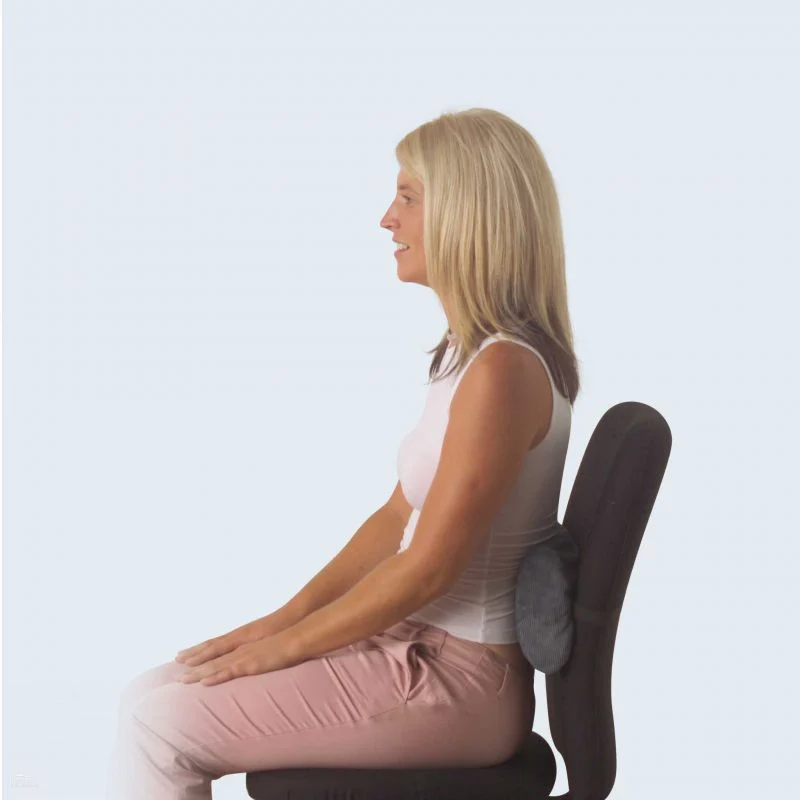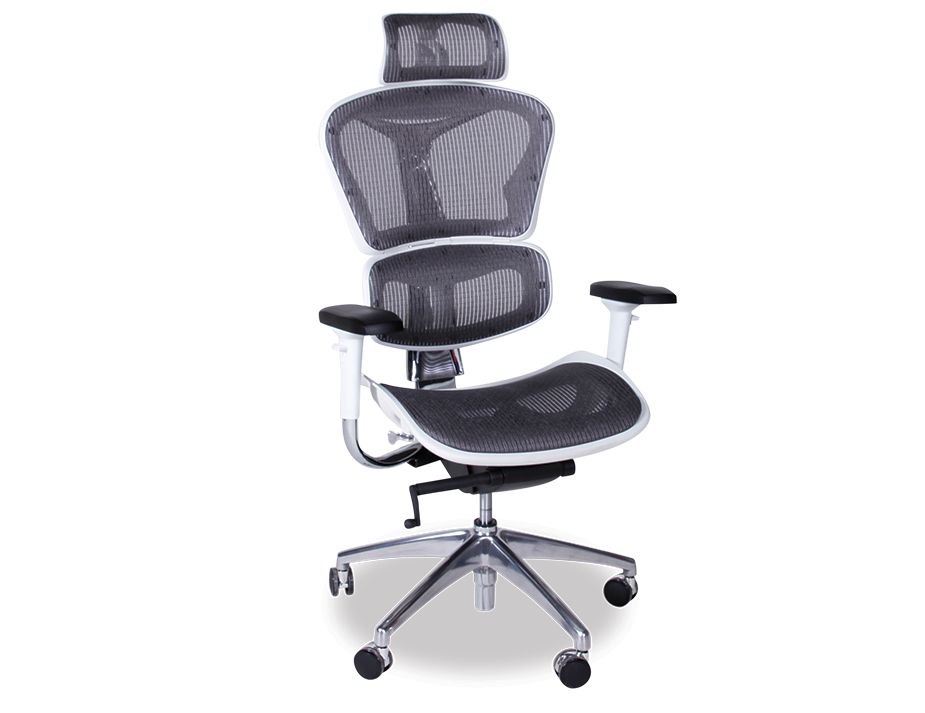In today's digital era, a significant amount of work happens from behind a desk and computer and your back resents it.
Prolonged periods of sitting, a common modern lifestyle habit, can have detrimental effects on our posture. This compromised posture can be a root cause of several long-term health issues, including back and knee injuries, lowered energy levels, and even problems with mood and self-confidence.
Luckily, with innovations in ergonomics, posture support pillows are specially designed to support a healthy posture while sitting, offering a potential solution to these prevalent problems.
At pillows.com.au, we offer a wide range of posture support pillows, each designed with a unique focus to cater to specific needs and preferences. In this comprehensive guide, we will delve deeper into the role of posture in your health, the types of posture problems, and how the right posture support pillow can make a difference.
Understanding the Importance of Correct Posture
Posture refers to the way we hold our bodies while standing, sitting, or lying down. Good posture is the correct alignment of body parts supported by the right amount of muscle tension against gravity. Poor posture, on the other hand, can lead to undue stress on our muscles and ligaments, causing discomfort, pain, and even permanent damage over time. Slouching, a common form of poor posture, places undue pressure on the mid to upper back. Similarly, sitting with your hip planted into the seat, such that your knees fall higher than your hip bones, can result in significant pressure on your lower back. These seemingly insignificant daily habits can potentially lead to the effects of poor posture that follow you after a workday.
At Therapuetic Pillow, we believe that prevention is the best medicine. Our selection of posture support pillows aims to mitigate these effects and promote healthy sitting habits.
Types of Posture Support Pillows
There are numerous types of posture support pillows available, each designed to provide relief and support in different ways. Some of the types you will find on our website include:

Lumbar Roll Cushion:
A lumbar roll is a cylindrical cushion placed behind your mid-back on a chair. It works against slouching by forcing your upper body to stay upright when you sit against it. It discourages sinking forward and down and promotes a more natural and healthier sitting posture. Our Lumbar Roll Cushion is designed with superior-quality materials to ensure durability and comfort.
Back Form Cushion:
A back form is a flatter, curved cushion placed on the back of your chair. While it provides less compensation for slouching compared to a lumbar roll, it offers support for the spine to fall into a natural curve. Our back form cushions are designed to conform to the natural curve of your spine, promoting better posture and relieving back pain.
Diffuser Cushions:
Diffuser cushions are seat cushions made of durable materials, such as memory foam or polyester. They work by diffusing the pressure on your legs as you sit, making long periods of sitting more comfortable and encouraging proper posture. In our collection, you will find diffuser cushions of different materials and designs to suit your comfort and support needs.
Wedge Cushions:
A wedge cushion not only diffuses pressure but also provides an angled lift that reduces pressure on the lumbar region and lifts the hips. This effect decreases pressure on the knees, reducing the risk of injury over time. Check out our range of wedge cushions for maximum comfort and posture support.
Lightweight Portable Support Pillows:
Most of these cushions and back support pillows are lightweight and can be taken anywhere. They are ideal for not only your office chair but also in your car on your daily work commute, a long plane ride, or even for sitting at home and watching

Consider using Ergonomic Office Chairs in combination with a back support
Ergonomic office chairs are a vital investment in your health and productivity. They are designed with the human body in mind, aiming to provide optimum comfort and support throughout your workday. These chairs have adjustable settings to suit your body type and work style, allowing you to modify the height, armrest position, and back support for a custom fit.
One of the primary benefits of ergonomic chairs is their ability to alleviate back pain. They have specific lumbar support that conforms to your back's natural curve, reducing stress on the lumbar region and preventing slouching. Over time, this can alleviate and prevent lower back pain, a common ailment in today's desk-bound jobs.
Additionally, ergonomic chairs encourage good posture. With their adjustable features, you can set the chair to promote an upright posture, with your feet flat on the floor, and your hips and knees at a 90-degree angle. This optimal position supports good blood circulation and minimizes the risk of stiffness and repetitive strain injuries.
Moreover, ergonomic chairs contribute to increased productivity. When you're comfortable and free from distracting discomfort or pain, you're likely to focus better and work more efficiently. In this way, an ergonomic chair can not only improve your health but also positively impact your work performance.
It's important to note that while ergonomic chairs offer numerous benefits, they are most effective when combined with good practices such as regular movement and breaks, as well as complementary ergonomic tools like posture support pillows. At pillows.com.au, we offer a range of support tools designed to work hand in hand with your ergonomic chair to optimize your comfort and health.
Do you want to learn more? Read our Frequently Asked Questions for...
Losing weight can indeed improve posture. When we carry excess weight, especially around the abdomen, it can put a strain on our back muscles and spine, leading to poor posture. By shedding those extra pounds, the load on our back is reduced, allowing our muscles to work more efficiently and our spine to align properly. Additionally, weight loss often involves strengthening exercises, such as core workouts, which can further enhance posture by strengthening the muscles that support the spine. So, by focusing on weight loss, you can positively impact your posture and overall spinal health.
Losing weight can have a significant impact on improving posture. By reducing the strain on our back muscles and aligning our spine correctly, weight loss helps us maintain a more upright and balanced posture. Incorporating exercises that strengthen the core muscles can further enhance posture. So, if you're looking to improve your posture, shedding those extra pounds through a combination of healthy eating and regular exercise can be a beneficial step towards achieving your goal.
 0
0 0
0To improve your posture, there are several simple steps you can take. Firstly, be mindful of your sitting and standing positions. When sitting, ensure your feet are flat on the floor and your back is straight against the chair. Avoid slouching or hunching over. When standing, distribute your weight evenly on both feet and keep your shoulders relaxed. Secondly, incorporate exercises that strengthen your core muscles, such as planks or yoga poses like the cat-cow stretch. These exercises help support your spine and promote better posture. Additionally, take regular breaks from sitting or standing for long periods to stretch and move around. Lastly, consider using ergonomic furniture or accessories, like a supportive chair or an adjustable desk, to maintain a good posture throughout the day. By following these tips, you can gradually improve your posture and reduce the risk of developing related discomfort or pain.
 0
0 0
0Back supports can be beneficial for individuals experiencing back pain or discomfort. These supports are designed to provide additional stability and help maintain proper posture, which can alleviate strain on the back muscles. By wearing a back support, it can help distribute the weight evenly across the spine, reducing the pressure on specific areas. This can be particularly helpful for individuals who have to sit or stand for long periods, as it can help prevent slouching and promote a more aligned posture. However, it is important to note that back supports should not be solely relied upon as a long-term solution. It is recommended to consult with a healthcare professional to determine the underlying cause of the back pain and to develop a comprehensive treatment plan that may include exercises, stretches, and lifestyle modifications in addition to using a back support.
 0
0 0
0Yes, you can use back support while sleeping to help alleviate discomfort and promote better spinal alignment. Back support, such as a supportive mattress or a specially designed pillow, can provide the necessary cushioning and maintain the natural curvature of your spine while you sleep. It helps distribute your body weight evenly, reducing pressure on your back and relieving strain on your muscles. By using back support, you can wake up feeling more refreshed and experience less pain or stiffness in your back.
Using back support during sleep is particularly beneficial for individuals who suffer from back pain or have conditions like sciatica or herniated discs. It can help reduce the risk of developing further back problems and improve the quality of your sleep. Remember to choose a back support option that suits your specific needs and preferences, as everyone's requirements may vary. Consulting with a healthcare professional or trying out different options can help you find the most suitable back support for a comfortable and restful night's sleep.
 0
0 0
0Yes, lumbar support cushions can be effective in providing support and relieving discomfort in the lower back. These cushions are specifically designed to help maintain the natural curve of the spine and promote proper posture while sitting. By providing additional support to the lumbar region, they can help alleviate strain and reduce the risk of developing back pain. Support cushions are often used by individuals who spend long hours sitting at a desk or driving, as they can help reduce the pressure on the lower back and improve overall comfort. However, it's important to note that the effectiveness of lumbar support cushions may vary depending on individual needs and preferences. It's recommended to try different types of cushions to find the one that suits you best and consult with a healthcare professional if you have any specific concerns or conditions related to your back.
Lumbar support cushions can indeed work by providing additional support to the lower back and promoting proper posture. They are designed to help maintain the natural curve of the spine and reduce strain on the lumbar region. While their effectiveness may vary from person to person, many individuals find them helpful in relieving discomfort and improving overall comfort, especially during prolonged periods of sitting. It's advisable to try different types of support cushions to find the one that suits your needs best and consult with a healthcare professional if you have any specific concerns or conditions related to your back.
 0
0 0
0To support your back while sleeping, there are a few key things you can do. Firstly, it's important to choose the right mattress and pillow. Look for a mattress that provides adequate support for your back, ensuring it is neither too firm nor too soft. A medium-firm mattress is generally recommended. Similarly, opt for a pillow that keeps your head and neck aligned with your spine, promoting proper back support.
Additionally, consider your sleeping position. If you sleep on your back, placing a pillow under your knees can help maintain the natural curve of your spine. For those who prefer sleeping on their side, placing a pillow between your knees can help align your hips and reduce strain on your back. Lastly, if you sleep on your stomach, it's advisable to place a pillow under your lower abdomen to prevent excessive arching of your back.
Remember, everyone's needs may vary, so it's essential to find what works best for you. Experiment with different sleeping positions, pillows, and mattresses to discover the optimal back support that ensures a comfortable and restful night's sleep.
 0
0 0
0To use lumbar back support, start by positioning the support cushion or pillow against the small of your back, where your spine curves inward. Make sure it fits comfortably and provides adequate support. You can use it while sitting on a chair, car seat, or even on your bed. The lumbar back support helps maintain proper posture and reduces strain on your lower back. It can alleviate discomfort and prevent back pain by promoting a healthy spinal alignment. Remember to adjust the support as needed to find the most comfortable position for you. Regular use of lumbar back support can provide relief and support for your back, especially during long periods of sitting or when engaging in activities that may strain your lower back.
In addition to using lumbar back support, it is essential to practice good posture habits throughout the day. Sit up straight, with your shoulders relaxed and your feet flat on the floor. Avoid slouching or hunching forward, as this can strain your back muscles. Take breaks from sitting every hour or so, and stretch or walk around to relieve any tension in your back. Engaging in regular exercise, such as core-strengthening exercises and gentle stretching, can also help improve your back's strength and flexibility. Remember, using lumbar back support is just one part of maintaining a healthy back. By combining it with proper posture, regular breaks, and exercise, you can effectively support your back and reduce the risk of discomfort or pain.
 0
0 0
0








